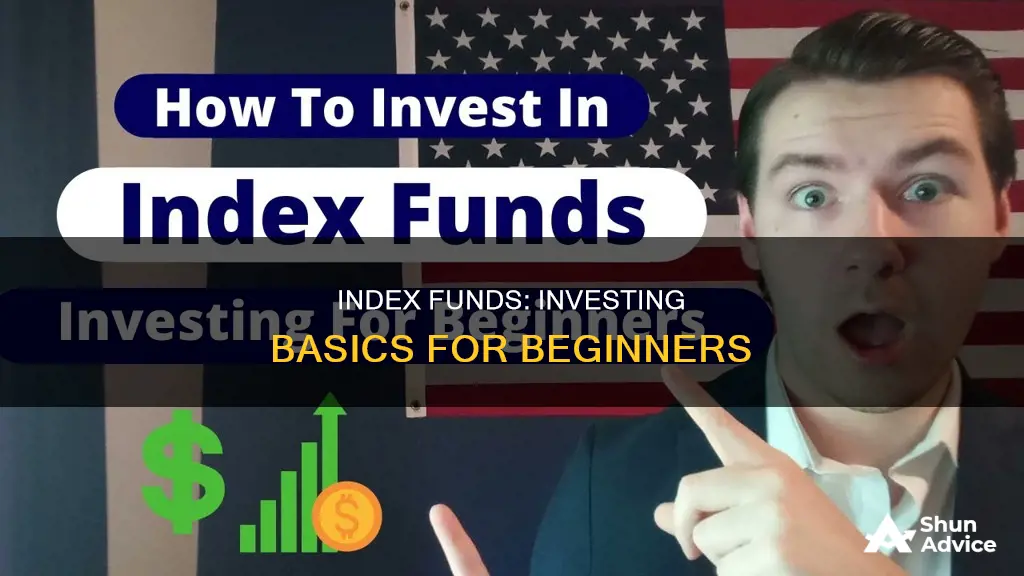
Index funds are a great way for beginners to start investing. They are a low-cost, easy way to build wealth and are less expensive than actively managed funds. They are also considered a passive management strategy, meaning they don't need to actively decide which investments to buy or sell. Index funds are often used to help balance the risk in an investor's portfolio, as market swings tend to be less volatile across an index compared to individual stocks.
1. Decide on your investment goals and risk tolerance: Determine your financial goals, risk tolerance, and investment horizon. This will help you choose the right index fund strategy and asset allocation.
2. Choose an index: Select a broad market index like the S&P 500 or a specific sector or theme, such as technology or socially responsible companies.
3. Research index funds: Compare different index funds that track your chosen index, considering factors such as fees, performance, and fund size.
4. Open an investment account: Set up an account with a brokerage firm or a mutual fund company that offers the index fund you want to invest in.
5. Pick your index fund(s): Consider factors such as fund size, fees, and investment minimums when selecting the specific index fund(s) to invest in.
6. Buy shares of the index fund(s): Decide how much you want to invest in each fund and place your trade through your brokerage account or directly with the fund provider.
7. Regularly review and rebalance your portfolio: Set up a schedule to review your index funds' performance and rebalance your portfolio to ensure it aligns with your investment goals and risk tolerance.
| Characteristics | Values |
|---|---|
| Type of investment vehicle | Mutual fund or exchange-traded fund (ETF) |
| Purpose | To match the returns of a specific market index |
| Benefits | Low fees, tax advantages, low risk, diversification, good for beginners |
| Drawbacks | Vulnerable to market drops, less opportunity to outperform the market |
| How to invest | Decide on goals, pick a strategy, research, open an investment account, purchase, set up a plan to keep investing regularly |
What You'll Learn

Understand the benefits of index funds
Index funds are a great investment for building wealth over the long term. They are a low-cost, easy way to build wealth and are popular with retirement investors. Here are some of the benefits of investing in index funds:
- Low fees: Index funds are usually far less costly than alternatives like actively managed funds. That's because an index fund manager just has to passively buy the stocks or other investments in an index—you don't have to pay them to try to come up with stock picks of their own.
- Tax efficiency: Index funds are quite tax-efficient compared to many other investments. They generally don't have to do as much buying and selling of their holdings as actively managed funds, so they avoid generating capital gains that can add to your tax bill.
- Diversification: Index funds offer diversification, leaving you less likely to suffer big losses if something bad happens to one or two companies in the index.
- Minimal investment research: You can rely on the index fund's portfolio manager to simply match the underlying index's performance over time.
- Building your portfolio over time: When you use index funds, you are a passive investor. You can invest month after month and ignore short-term ups and downs, confident that you'll share in the market's long-term growth and build your nest egg.
- Lots of choices: You can buy broad index funds, such as those that track the S&P 500, or more focused index funds that invest in specific sectors or trends.
- Performance: Index funds often perform better than actively managed funds over the long term. Despite the fact that fund managers do a lot of work to "beat the market", they very rarely do. According to SPIVA, only 29% of actively managed funds beat the S&P 500 in 2019. In 2021, only 9% of those funds continued to beat their benchmark.
Investing in Commodities: A Smart Fund Move?
You may want to see also

Know the drawbacks of index funds
Index funds are a great investment option for beginners and experienced investors alike. However, like any other investment vehicle, they come with certain drawbacks. Here are some of the key disadvantages of investing in index funds:
- No Downside Protection: Index funds, such as those tracking the S&P 500, will give you the upside when the market is doing well, but they also leave you vulnerable to market downturns. When the index your fund is tracking plunges, your index fund will follow suit.
- Lack of Reactive Ability: Index funds do not allow you to take advantage of specific investment opportunities. If a stock becomes overvalued, it carries more weight in the index, but this is when you would ideally want to reduce your exposure to that stock. With index funds, you cannot act on such insights.
- No Control Over Holdings: Index funds are set portfolios, and investors have no control over the individual holdings. You may have specific companies that you want to invest in or avoid for various reasons, but with index funds, the components of the portfolio are predetermined and out of your hands.
- Limited Exposure to Different Strategies: Index funds may not give you access to successful investing strategies. There are countless strategies that investors have used with success, but buying an index of the market may not allow you to benefit from these strategies. With index funds, you are limited to the performance of the specific index you are tracking.
- Dampened Personal Satisfaction: Investing in index funds can be less exciting than picking individual stocks. You may still find yourself constantly checking the market's performance and worrying about economic turmoil, but you won't have the satisfaction of making individual investment choices and seeing them pay off.
- Moderate Annual Returns: Due to their diversified nature, index funds may provide more moderate annual returns compared to more targeted investment portfolios. The broad-based basket of stocks in an index fund may be dragged down by underperforming assets.
- Fewer Opportunities for Short-Term Growth: Index funds are typically considered long-term investments. The passive management style of index funds means there is less opportunity for quick adjustments, and you may experience slower gains compared to investing in individual stocks or other higher-risk investments.
Axis Long Term Equity Fund: A Smart Investment Strategy
You may want to see also

Learn how to start investing in index funds
Index funds are a great way to build wealth over time, and they are especially popular with retirement investors. They are a group of stocks that mirror the performance of an existing stock market index, such as the S&P 500. Index funds are passively managed, meaning they don't actively decide which investments to buy or sell. Instead, they aim to be the market by buying stocks of every firm listed on a market index.
Have a goal for your index funds:
Before investing, it is important to understand your financial situation, life goals, risk tolerance, and budget. For example, if you are close to retirement, you might prefer the stability of a bond index fund over a stock index fund.
Research index funds:
When researching index funds, consider the company size and capitalization, geography, business sector or industry, asset type, and market opportunities. You can also look at the fees, fund size, and liquidity of the index fund.
Pick your index funds:
When choosing an index fund, cost is an important factor. Index funds are cheap to run because they are automated, but don't assume that all index funds are cheap. Compare the management costs of different funds to find the best option for you.
Decide where to buy your index funds:
You can purchase an index fund directly from a mutual fund company or a brokerage. Consider factors such as fund selection, convenience, trading costs, and impact investing when choosing where to buy your index fund.
Buy shares of an index fund:
To buy shares of an index fund, you'll need to open an investment account such as a brokerage account, individual retirement account (IRA), or Roth IRA. Then, decide how much you want to invest in each fund type based on your risk tolerance and financial goals.
Keep an eye on your index funds:
Index funds are passive investments, but that doesn't mean you should ignore them completely. Check in regularly to make sure your index fund is mirroring the performance of the underlying index. Also, keep an eye on the fees to make sure they don't start stacking up over time.
Vanguard Funds: Ethical Investing and Weapons Manufacturers
You may want to see also

Compare index funds with other funds
Index funds are a type of investment vehicle that tracks a market index, such as the S&P 500 or the Dow Jones Industrial Average. They are designed to mirror the performance of the index by holding the same securities in equivalent proportions. This passive management strategy means that index funds are considered less risky than individual stocks and typically carry lower fees than actively managed funds.
Comparison with Actively Managed Funds
Index funds differ from actively managed funds in several ways. Actively managed funds aim to beat the market, whereas index funds aim to match the market's performance. Actively managed funds involve fund managers actively deciding which investments to buy or sell, whereas index funds are passively managed, with investment decisions based solely on trying to match the index. This means that index funds generally have lower fees than actively managed funds, as there is no need to pay for a fund manager's expertise.
Over the long term, index funds tend to outperform actively managed funds. According to SPIVA, only 29% of actively managed funds beat the S&P 500 in 2019, and only 9% continued to beat it in 2021.
Comparison with Mutual Funds
Index funds can take the form of mutual funds or exchange-traded funds (ETFs). Mutual funds are actively managed investment funds that pool money from multiple investors to purchase a diversified portfolio of assets, such as stocks, bonds, or other securities. ETFs are baskets of securities that trade on an exchange like a stock.
One advantage of index funds over mutual funds is that index funds generally have lower fees. Mutual funds typically charge higher fees because they are actively managed, whereas index funds are passively managed.
Additionally, index funds offer more flexibility than mutual funds in terms of buying and selling. Mutual funds are typically bought and sold at the end of the trading day, based on the fund's closing price, whereas ETFs can be bought and sold throughout the trading day, like stocks.
Comparison with Individual Stocks
Compared to individual stocks, index funds offer the benefit of diversification. By investing in an index fund, you gain exposure to a basket of securities, rather than putting all your eggs in one basket by investing in a single stock. This diversification helps to reduce risk and can lead to more consistent returns over time.
However, with individual stocks, you have the potential to beat the market, which is not possible with index funds. Index funds are designed to match the market's performance, so while they may provide stable returns, they are not likely to generate outsized gains.
In conclusion, index funds offer a simple, low-cost way to invest in a diversified portfolio of securities. They are a passive investment strategy that mirrors the performance of a market index. Compared to other types of funds and individual stocks, index funds tend to have lower fees and are considered less risky due to their diversified nature.
Fidelity Index Funds: Where to Invest Your Money Wisely
You may want to see also

Research different types of index funds
Index funds are a type of investment vehicle that aims to match the returns of a specific market index. They are a great investment for building wealth over the long term and are popular with retirement investors. There are many different types of index funds, each with its own unique strategy and focus. Here are some of the most common types of index funds:
Broad Market Index Funds
Broad market index funds aim to capture the performance of a large segment of the investable stock market. For example, an index fund tracking the NIFTY 500 index would give investors exposure to stocks across different sectors and market caps. These funds are an excellent investment option for long-term investors. Examples of broad market index funds include the Vanguard Total Stock Market ETF and the Schwab U.S. Broad Market ETF.
Market Capitalization Index Funds
Market capitalization index funds invest based on specific market capitalization ranges. A company's market cap is equal to the total value of its outstanding shares, and companies can be divided into large-cap, mid-cap, or small-cap categories based on those values. Examples of market cap index funds include the Vanguard 500 Index Fund and the iShares Russell 2000 ETF.
Equal Weight Index Funds
Equal weight index funds solve the issue of some companies becoming overvalued and accounting for a significant portion of a fund's assets. In these funds, each holding makes up roughly the same percentage of fund assets. For example, if a fund has 100 holdings, each one will account for about 1% of the portfolio. Popular equal weight funds include the Invesco S&P 500 Equal Weight ETF and the Direxion Nasdaq-100 Equal Weighted Index Shares.
Fixed Income/Debt Index Funds
Fixed income or debt index funds track bond indices, allowing them to charge low expense ratios compared to actively managed funds. Bonds can play an important role in your portfolio, especially during retirement. Examples of fixed income/debt index funds include the Vanguard Long-Term Bond ETF and the iShares 1-5 Year Investment Grade Corporate Bond ETF.
Sector-Based Index Funds
Sector-based index funds are great for investors who have a specific view on a certain area of the economy. These funds allow investors to express an investment opinion without having to do all the work of digging into individual securities. Examples of sector-based index funds include the Consumer Discretionary Select Sector SPDR Fund and the Vanguard Communication Services Index Fund.
International Index Funds
International index funds are an easy way to gain exposure to geographic areas outside of your home country. You can purchase a diversified portfolio of companies from a single fund, making it simple to invest in economies in Europe, Asia-Pacific, or other regions. Examples of international index funds include the Vanguard FTSE Emerging Markets ETF and the iShares Core MSCI Total International Stock ETF.
Socially Responsible Index Funds
Socially responsible index funds have become increasingly popular as investors pay more attention to how their money is invested. These funds may include companies with a focus on environmental, social, and governance issues, or they may exclude companies involved in activities such as the sale of firearms, alcohol, tobacco, or gambling. Examples of socially responsible index funds include the Vanguard ESG U.S. Stock ETF and the iShares Global Clean Energy ETF.
You Invest: Exploring Mutual Fund Options
You may want to see also
Frequently asked questions
Index funds are a great way to build wealth over the long term. They are a low-cost, easy way to invest, and they often perform better than actively managed funds. Index funds are also less expensive than actively managed funds and typically carry less risk than individual stocks.
When choosing an index fund, it's important to consider your personal situation and life goals. For example, if you're close to retirement, you might prefer the relative stability of a bond index fund rather than an equity index fund. It's also important to research the fees and portfolio construction of different funds, as these can vary significantly.
To invest in an index fund, you'll need to open an investment account with a broker or fund company that offers the fund you want. You can then purchase shares of the index fund, either directly from the fund provider or through a brokerage account.







